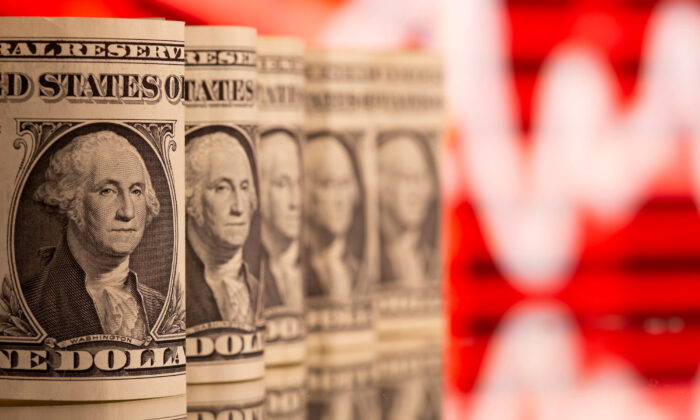


A top recession indicator is flashing red for the 21st consecutive month, signaling a downturn on the horizon. But a chorus of economists has championed a soft landing, with many experts expecting the U.S. economy to avert back-to-back quarters of negative growth.
The Conference Board’s Leading Economic Index (LEI), a gauge of the economy’s strength, slipped 0.1 percent in December, up from the 0.5 percent drop in November. This came in slightly better than the consensus estimate of negative 0.3 percent. The LEI slumped 2.9 percent during the six-month span between June and December, up from the 4.3 percent decline in the previous six-month period.
The latest reading continues “to signal underlying weakness in the U.S. economy,” said Justyna Zabinska-La Monica, the senior manager of business cycle indicators at The Conference Board.
“As the magnitude of monthly declines has lessened, the LEI’s six-month and 12-month growth rates have turned upward but remain negative, continuing to signal the risk of recession ahead,” she said in a statement. “Overall, we expect GDP growth to turn negative in Q2 and Q3 of 2024, but begin to recover late in the year.”
The two periods when the LEI was in subzero territory for longer occurred from 1973 to 1973 and 2007 to 2009. Each time, a recession happened.
In addition, The Conference Board’s Coincident Index, which assesses various indicators like payroll employment, industrial output, and personal income less transfer payments, rose 0.2 percent, unchanged from the previous month.
Despite recession calls last year, the economy has defied these expectations, even in an environment of high inflation, rising interest rates, and substantial debt growth.
The fourth-quarter GDP will be released on Jan. 25. The Federal Reserve Bank of Atlanta’s GDPNow and the New York Fed Staff Nowcast models estimate 2.4 percent growth for the October–December period.
Recession Talk in 2024
The odds of a recession within the next year fell to 39 percent, according to The Wall Street Journal’s latest survey of academic and business economists. This is down from 48 percent in October.Looking ahead, experts forecast growth to be just 1 percent in 2024, down from last year’s projected 2.6 percent.
Similar numbers were spotted in the National Association for Business Economics (NABE) survey. The polling data highlighted that 91 percent of respondents think the probability of the U.S. economy slipping into a recession over the next year is 50 percent or less.
Consumer sentiment has also rocketed in the last two months after being stuck in the doldrums for nearly all of 2023.
The University of Michigan’s Consumer Sentiment Index (CSI) soared to its highest level since 2021 this month, supported by easing inflation expectations and strengthening income predictions.
However, some economists and business leaders argue that it is too premature to champion a mission accomplished.
“I’m a little skeptical in this kind of Goldilocks kind of scenario,” JPMorgan Chase CEO Jamie Dimon told Fox Business Network last week. “It might be a mild recession or heavy recession.”

James Iuorio, director of the TJM Institutional Services, also said in an during an interview with the business news network on Jan. 22 that “we are absolutely going to go into a recession,” citing a slump in bank lending, soaring credit card debt, and rising delinquency rates.
Bank credit has tumbled for three straight quarters, according to recent data from the Federal Reserve. The last time it was this prolonged occurred during the Global Financial Crisis.
Credit card debt is close to $1.1 trillion, while delinquency rates have nearly doubled.
“I have it at zero percent chance we avoid a recession this year,” he added, explaining that government spending has obfuscated economic conditions.
Last year, the government accounted for about one-quarter of all job creation. In the third quarter, government spending contributed one-third of growth.
Others, including Matt Schoeppner, the senior economist at U.S. Bank, expect the country to face a “growth recession,” an ecosystem of slowing growth and a labor market staying intact.
“It seems likely the economy may avoid a recession in the near term, though we can expect that real GDP growth will remain modest over time,” said Mr. Schoeppner in a note. “It might qualify as what we call a ‘growth recession,’ where we see a slow economy, but with few ramifications for the job market.”
According to the Fed’s Summary of Economic Projections, the real GDP is expected to be 1.4 percent this year, followed by readings of 1.8 percent in 2025 and 1.9 percent in 2026.
White House Optimistic
The turnaround in evaluating the U.S. economy has the current administration more ebullient less than 10 months until the presidential election.“In the latest sign that President Biden’s economic plan is delivering results that more Americans are feeling, today we learned consumer sentiment surged by 29 percent over the last two months. That’s the biggest two-month jump in more than 30 years,” said Jared Bernstein, the head of the Council of Economic Advisers, in a statement. “We have more work to do, but we’re on the right path as we execute President Biden’s agenda, and people are starting to feel it.”
Earlier this month, Treasury Secretary Janet Yellen declared that the U.S. economy accomplished a soft landing.
“What we’re seeing now, I think we can describe as a soft landing, and my hope is that it will continue,” Ms. Yellen said in a Jan. 5 interview with CNN.
“Wage increases are running over price increases now,” she added. “American workers are getting ahead, and the progress for the middle-income families is very noticeable.”
At the same time, the data numbers are not translating to improving poll numbers.
The latest Harvard-Harris survey showed that President Joe Biden’s approval rating on the economy is 40 percent.


